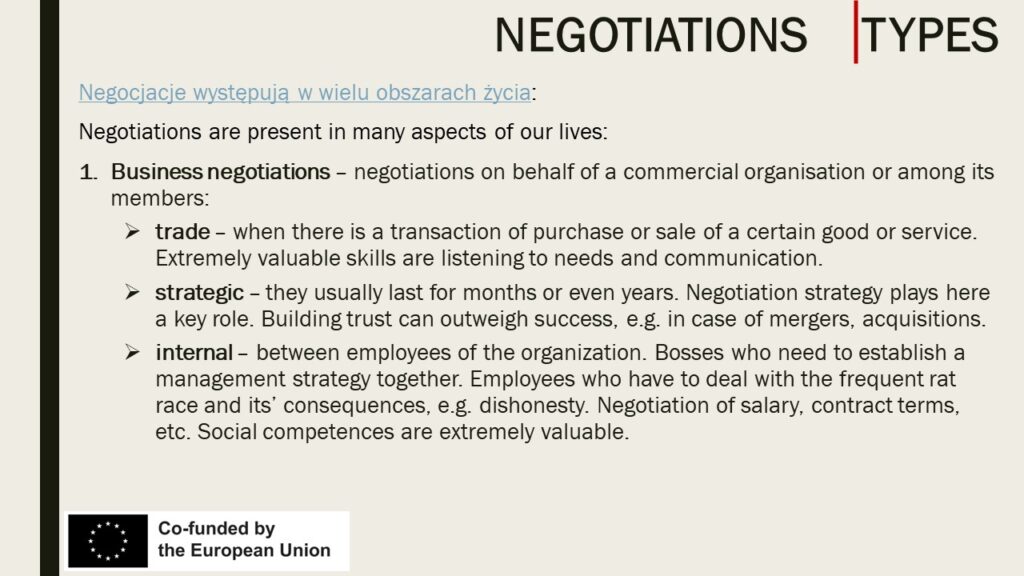
Negotiations occur in many areas of life. Personally, I specialize in commercial negotiations, both in the business area (purchases, prices, terms of contracts) and non-business (high-value purchases, in particular real estate and developer negotiations). In this article, we will see the universality of negotiations. The most important thing is that the awareness of the multitude and diversity of negotiations broadens cognitive horizons, giving us access to a wider range of tools and styles that we can choose during our negotiation challenges. Below I present to you the types of negotiations, along with paying attention to what they are characterized by (i.e. what you need to learn to practice them and what you can learn from people who practice them). To begin with, let us note that the set presented below is open-ended, as the wealth of negotiation types is too extensive to be collected in such an article. In general, negotiations can be divided into three types: business, legal-diplomatic and non-business.
1.Business – negotiations on behalf of a commercial organization or among its members.
Commercial – when there is a transaction to buy or sell a certain good or service. Exceptionally valuable skills are listening to needs and communication.
Strategic – they usually last for months or even years. Negotiation strategy plays a key role. Building trust can be the key to success.
1.Mergers
2.Acquisitions
Internal – between employees of the organization. Bosses who need to agree on a management strategy. Employees who have to deal with the frequent rat race and all related phenomena, e.g. dishonesty. Negotiating salary, contract terms, etc. Social skills are extremely valuable.
2.Legal and diplomatic – negotiations specific to the government sector.
Judicial – negotiations based on normative acts. Negotiations take place within the legal system, knowledge of which is necessary. In the courtroom, the skills of hard argumentation and logical interpretation are particularly useful.
Police – negotiations in which one of the parties is a person representing the authority and there is usually an element of threat. The police negotiator should be familiar with psychology, as he will have to deal with people who are disturbed or not adapted to life in society. Particularly useful is cold blood, resistance to fear and fear, the ability to act under pressure.
Diplomatic – negotiations on behalf of the nation. They take place in a multicultural, multilingual and often multi-religious environment. In order to skilfully navigate through such an environment, diplomats must be open to understanding completely different ways of thinking and being, as well as familiarity with and respect for other cultures.
Political – one party is a politician, the other party may be a politician or a group of citizens. In the case of the latter, reaching different social groups is a particular challenge. A person who does it skillfully has high competence in adapting the language to the recipient.
3.Non-business – we negotiate as a private person.
Purchase or sale – for a private person, negotiations can result in saving money when buying an apartment, yacht, luxury car, etc. Similarly with selling your property. It is useful to know the market of a given good.
Family – effective communication in the family can be a challenge, because this social group is characterized by special laws of sociology. It is useful to be able to come out of the personality typical of a family relationship. By the way, inheritance disputes are family issues until the case goes to court or a mediator steps in.
With friends – we are looking for agreement in a group of people with loose relations. Most often, thanks to the long-term relationship and their freedom, we can get to know people to be able to get along with them more efficiently.